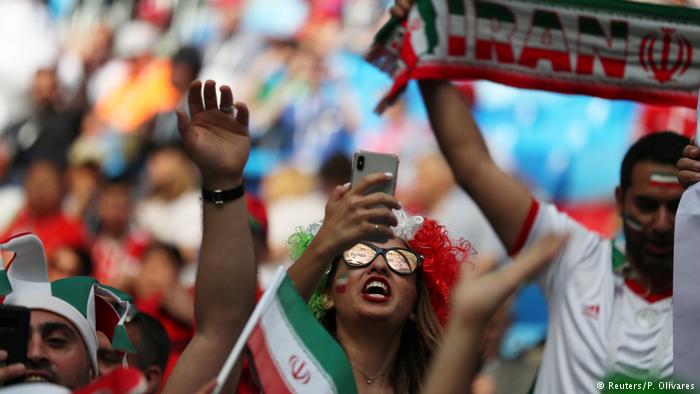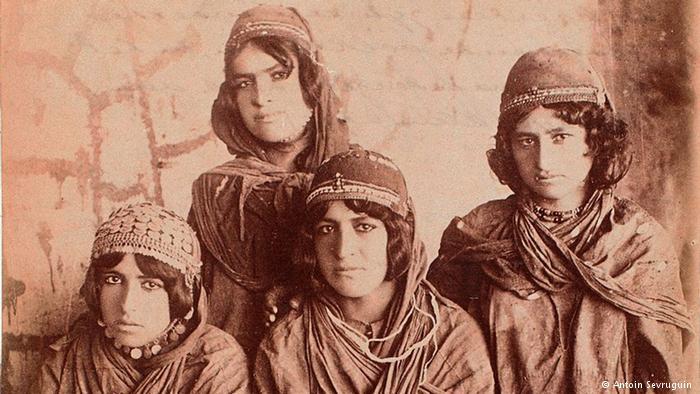Iranian women hope 2018 World Cup is turning point for stadium ban
The World Cup has given Iranian women the chance to do what many take for granted — going to watch football matches. Activists are now pushing world football’s governing body FIFA to end the ban issue once and for all.
The passion for football runs deep in Maryam Qashqaei Shojaei’s family. Her uncle played professionally, and she herself was bitten by the football bug at a very early age. For her, the beautiful game evokes memories of shared moments among classmates, of bringing people together.
“Football is like a religion in Iran,” Shojaei told DW. “Everybody watches it. Even a concert doesn’t make so many people come to one place. Football is something that can unify us.”
However, Shojaei’s love of the sport has been tempered by an unfortunate reality in Iran: Ever since the revolution there in 1979, women have effectively been barred from entering sports stadiums. Despite the trouble it causes her, the civil rights activist has taken the issue to heart, starting her campaign called “NoBan4Women” after the last World Cup in 2014.
With millions of people around the world tuning in, she has used this year’s tournament to raise awareness of what female football fans face in Iran. Cameras have been quick to pick her out inside stadiums, as she hoists aloft her banner emblazoned with the words “Support Iranian Women to Attend Stadiums” and the hashtag #NoBan4Women.
The banner was temporarily confiscated before Iran’s match with Spain in Kazan last week. FIFA, world football’s governing body, subsequently apologized for a “misunderstanding by the local police officers.”
“I missed half the game,” Shojaei complained, although thankfully she did manage to watch Iran’s other Group B matches for the entire 90 minutes.

Women are not the only ones who struggle to understand that argumentation. “Women should not be penalized if men say vulgar things in stadiums,” said Iranian President Hassan Rouhani, himself a cleric. (Source: dpa)
‘A basic right’
While Iranian President Hassan Rouhani has hinted at the possibility of removing the ban, there is no concrete sign of it being lifted anytime soon. In March, 35 female fans were detained for trying to enter the Azadi Stadium in Tehran during an Iranian league match attended by FIFA President Gianni Infantino. Others have been more creative, getting into stadiums by disguising themselves as men with fake beards and moustaches.
Authorities in Iran say the ban – which has never actually been written into law – is in place to protect women from hearing men shout out obscenities. Shojaei finds that ridiculous, and says such rules are at odds with everything else in the country.
“Women should be allowed to go to stadiums for the very same reasons they’re allowed to live, to go to school, to watch a movie, to work,” said Shojaei, who has resided in the United States for the past six years. “This is a very, very basic right. We are human beings. Not being allowed to go to stadiums is awkward and doesn’t fit our society.”
Forgetting politics for a moment, Shojaei’s eyes light up when she talks about the atmosphere at the stadiums in Russia. Although she attended the 2015 Asian Cup in Australia, she had never experienced a World Cup match until now.
“When I was inside [the stadium] it was like a dream,” she said. “It was so big and so beautiful. What I like the most about this World Cup is that it’s not about the competition. Football is not a destination, it’s just a journey.”
Mixed feelings for activists
Another activist, Sara – who asked to keep her real identity hidden for fear of reprisals – watched Iran in person for the first time at this tournament.
However, Sara told DW her experience was also tinged with sadness because of what her friends and family were missing out on back home. She wishes she could have shared it with them.
“Going to stadium with “beard” is not always fun, sometimes they put you in police car cages”
But finally she went inside Azadi stadium as woman.#زنان_ورزشگاه #NoBan4Women https://t.co/x51y7VMvbt— OpenStadiums (@openStadiums) 27. Juni 2018
“When you go and see such a simple thing like a football match where everyone is enjoying themselves, you feel like, ‘Why must we have to spend all these years thinking about this and fighting for this?’ It is sad,” she said.
The two women have taken their battle to FIFA, saying it is the only global organization with the power to get the ban overturned. Shojaei has also set up a petition pressing the governing body on the matter, which currently boasts nearly 150,000 signatures. But she says has been rebuffed in her attempts to reach FIFA’s most senior woman, Secretary General Fatma Samoura.
“I expect women with high positions to be more proactive, especially in terms of what’s happening for Iranian female fans,” Shojaei said.
FIFA could force change
Moya Dodd, who served on FIFA’s ruling Executive Committee from 2013 to 2017, has been supporting the two activists in their fight. Dodd says she first raised the issue with then-President Sepp Blatter back in 2013, and calls it a “crystal clear example of gender discrimination in football.”
For his part, Infantino discussed the ban privately with Rouhani during his trip to Tehran in March, telling reporters afterwards that women would “have access to football stadiums soon.” But since then, things have gone quiet.
According to Article 4 of the FIFA statutes, any discrimination against people because of gender is “strictly prohibited and punishable by suspension or expulsion.”
In a statement responding to a list of questions from DW, FIFA said it was “fully committed to upholding human rights,” and that it has “continued the engagement with the Iranian counterparts at the highest levels in view of ensuring that concrete changes are implemented on the ground.”
However, the statement ignored a question about why the governing body had failed to enforce its own statute, saying only, “Any practice by a member association (…) that violates the fundamental rights of people involved in or affected by football is therefore in opposition to FIFA’s values.”
For Dodd, such statements don’t go far enough. She suggests FIFA has made some “admirable commitments” on human rights, but says even bolder action is required.
“The stadium ban is an egregious, long-standing breach that goes right to the heart of football,” the Australian told DW. “FIFA has a platform like no other to bring about change. Words like ‘human rights’ and ‘non-discrimination’ just sit on a page until FIFA enforces them. Now is the time for sports bodies to set deadlines and consequences when these words are ignored.”
Shojaei is hopeful that this World Cup will mark a turning point for women in Iran, so that by the time the next tournament rolls round in four years’ time, the issue will belong to the past. But Sara acknowledges that much work is still to be done.
“We have to keep up this pressure,” she said. “If we let go of this and feel like it’s going to be okay, it’s not. My concern is after the World Cup. Until we go to a Tehran derby it means nothing that all these things are happening. Back home it’s a completely different experience.”
Author: Jonathan Crane







